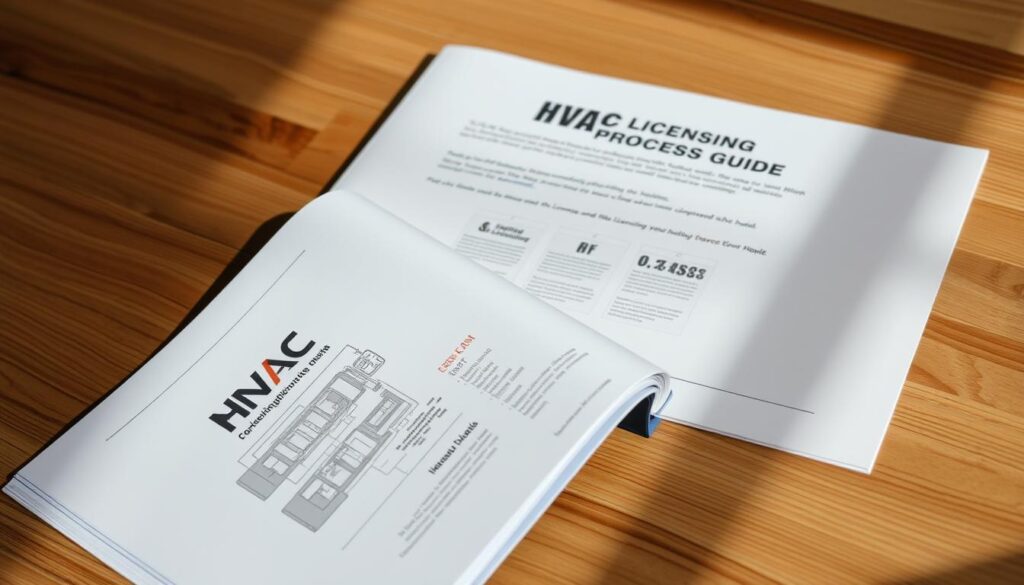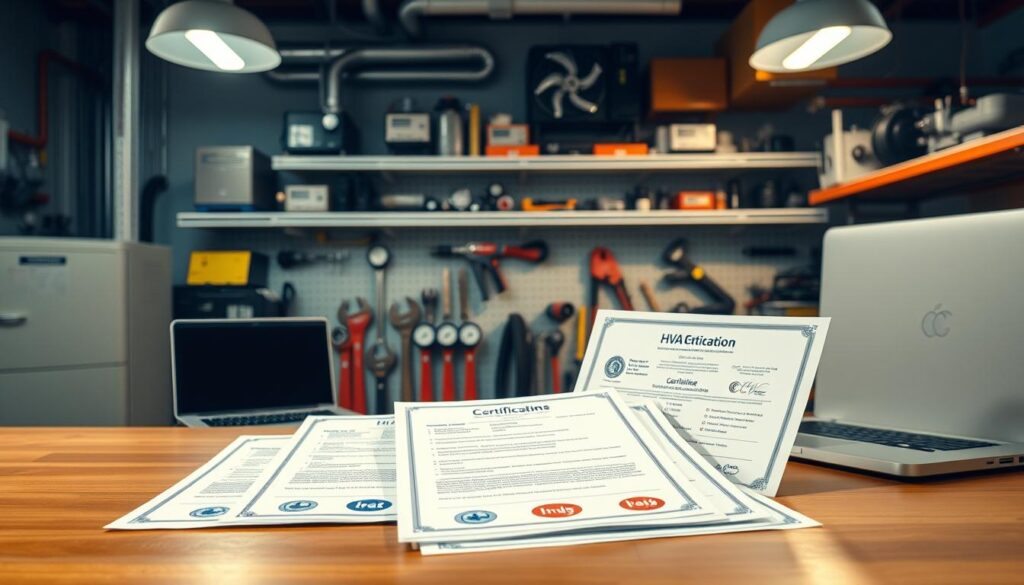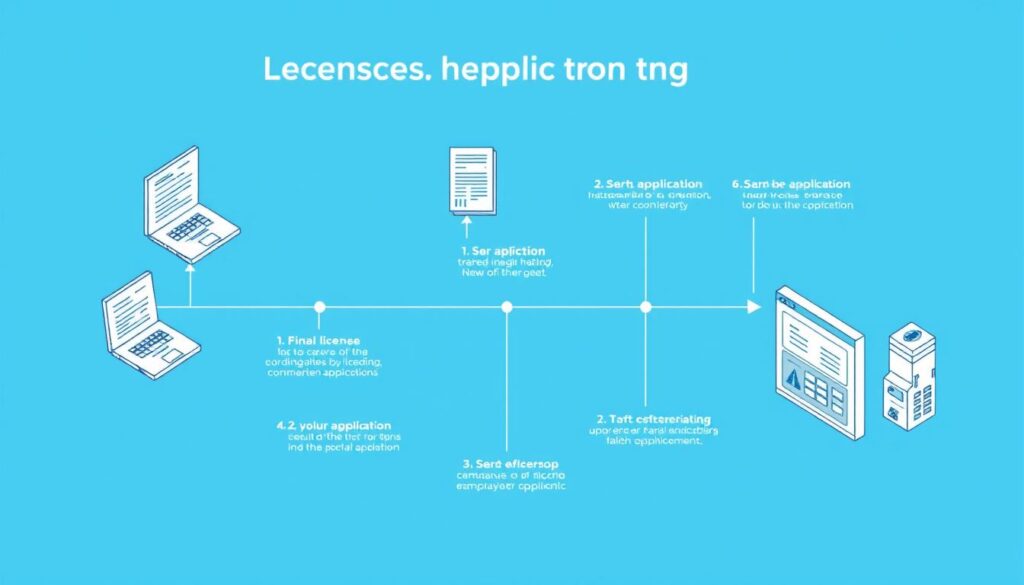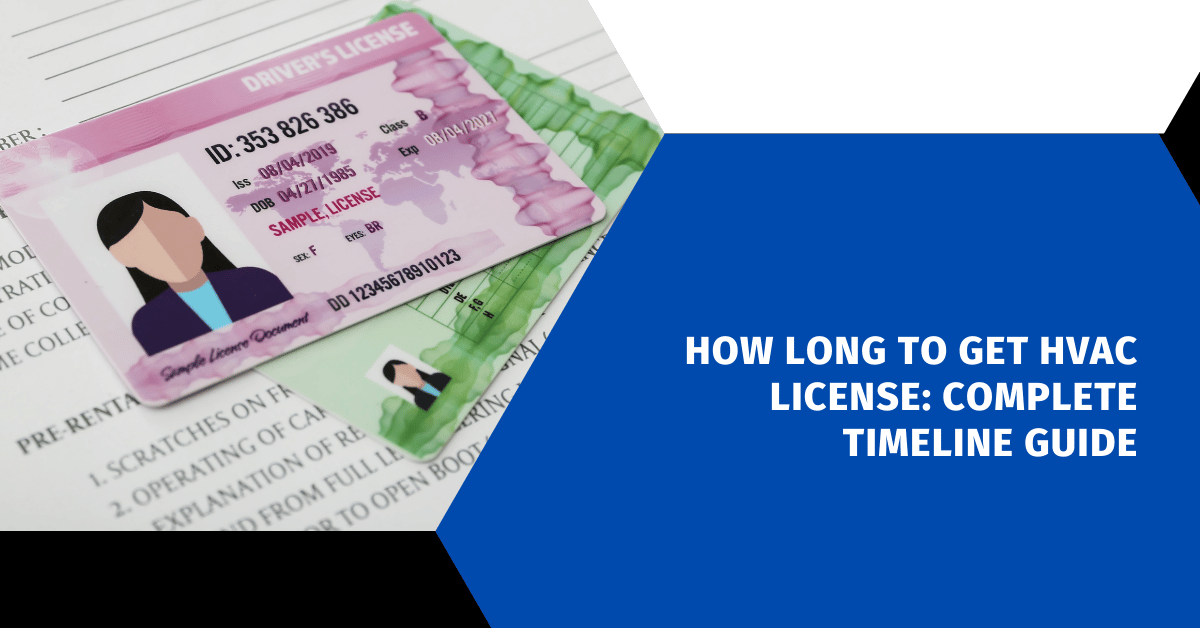Affiliate Disclosure
HVAC Guide Guys is a participant in the Amazon Services LLC Associates Program, an affiliate advertising program designed to provide a means for sites to earn advertising fees by advertising and linking to Amazon.
How Long to Get HVAC License? Are you curious about how long it takes to become an HVAC technician? The path to getting an HVAC license might seem long, but it’s worth it. With the right steps, you can start a fulfilling career in this growing field.

The HVAC industry is booming, with jobs growing 9% by 2032. Knowing how long it takes to get an HVAC license is key for those starting their career. It helps ensure a stable and rewarding job in the future.
To become a licensed HVAC technician, you’ll need to go through education, training, certification, and hands-on experience. The time it takes can vary based on your path and state rules. But, most people finish their licensing in 2-3 years.
Key Takeaways
- HVAC licensing typically takes 2-3 years to complete
- Job growth for HVAC technicians is projected at 9% through 2032
- Training programs range from 6 months to 2 years
- HVAC apprenticeships last 3-5 years
- Median annual wage for HVAC technicians is $57,300
Table of Contents
Understanding HVAC Licensing Basics
Getting into HVAC licensing can seem tough, but knowing the basics is key. To become a pro HVAC tech, you must meet certain requirements and pass important exams.
Most states require licenses for HVAC work to keep things safe and quality high. This process has many steps and needs certain skills to protect everyone involved.
Key Requirements for Licensing
To get an HVAC license, you must meet a few main criteria:
- Be at least 18 years old
- Have a high school diploma or GED
- Finish an accredited HVAC training program
- Have a valid government ID
- Have a clean criminal record
Different Types of HVAC Licenses
HVAC licenses differ by area, with various levels to choose from. Knowing these options helps you pick the best path for your career.
| License Type | Requirements | Experience Needed |
|---|---|---|
| Apprentice | Basic training | 0-2 years |
| Journeyman | Advanced training | 2-4 years |
| Master Technician | Extensive experience | 4+ years |
Age and Documentation Requirements
Passing the hvac license exam needs the right documents. You’ll need:
- Your Social Security Number
- Proof of your education
- A valid government ID
- Proof of work experience
- Exam application and fees
Remember, each state has its own rules for HVAC licenses. Always check local laws before starting your HVAC certification journey.
The Journey to Becoming a Licensed HVAC Professional
Starting an HVAC career needs hard work, smart planning, and knowing the path ahead. Your path to becoming a licensed HVAC pro has many important steps. These steps turn you from a beginner to a skilled technician.
HVAC training follows a clear path. It helps you learn key skills and meet industry needs. The journey includes several key points:
- Completing initial hvac certification courses
- Gaining practical work experience
- Obtaining necessary credentials
- Passing professional licensing examinations
Most states ask for a lot of work experience before giving full licensure. For example, California requires four years of work experience under a licensed contractor for a Class C-20 HVAC License.
Your growth will include:
- Technical education programs
- Apprenticeship opportunities
- Supervised on-the-job training
- Continuous skill enhancement
The HVAC field has great chances, with 19,000 new jobs expected by 2030. By taking in-depth hvac certification courses and getting hands-on experience, you’ll be set for a fulfilling HVAC career.
Explore Our HVAC Shop
Looking for top-rated HVAC tools, parts, and accessories? Visit our shop and find the perfect solution for your needs.
Visit the ShopEducational Requirements and Training Programs
Starting a career in HVAC needs careful thought about your education. The right training can greatly affect your future in this field. With over 415,800 HVAC workers in the U.S., picking the best education is key for your growth.
On your path to becoming an HVAC pro, you’ll find many educational paths. Knowing about different training lengths helps you choose wisely.
Vocational Schools and Technical Programs
Technical schools lead to HVAC skills. They give you a solid foundation with:
- Hands-on training
- Theory and system knowledge
- Practical installation skills
- Diagnostic and repair abilities
Apprenticeship Opportunities
HVAC apprenticeships offer real-world learning with experienced pros. They include:
- Paid on-the-job training
- Guided work experience
- Classroom lessons
- Mentorship from experts
The 6% job growth rate from 2022 to 2032 shows great chances for apprentices.
Online Training Options
Online learning offers flexible HVAC training. These programs add to traditional education with:
- Flexible schedules
- Self-paced learning
- Comprehensive curriculum
- Virtual tools
| Training Option | Duration | Typical Cost |
|---|---|---|
| Vocational School | 6-24 months | $15,000-$35,000 |
| Apprenticeship | 3-5 years | Minimal/Paid Training |
| Online Programs | 3-12 months | $1,000-$15,000 |
Your choice depends on your goals, learning style, and career dreams. Each option has its benefits for a successful HVAC career.
How Long to Get HVAC License: Timeline Breakdown
Knowing how long it takes to get an HVAC license is key to planning your career. The time it takes to get your HVAC license changes based on several important factors.
Getting your HVAC license involves several steps:
- Certificate programs: 6 months to 1 year
- Associate degree programs: 2 to 3 years
- Apprenticeship programs: 3 to 5 years
The time it takes to get your HVAC license depends on your education choice. Full-time students usually finish faster than part-time ones. After finishing your training, you’ll need to pass state-specific exams. This can take 15 to 90 days.
Several things can affect how long it takes to get your license:
- Educational program length
- Apprenticeship needs
- State licensing rules
- Exam prep and testing
Some states offer fast HVAC training to speed up certification. Those with experience in similar fields might get licensed quicker.
Pro tip: Always check your state’s specific licensing rules. They can greatly affect how long it takes to become a licensed HVAC pro.
Explore Our HVAC Shop
Looking for top-rated HVAC tools, parts, and accessories? Visit our shop and find the perfect solution for your needs.
Visit the ShopWork Experience Requirements for Licensing
Getting the right work experience is key to getting your HVAC certification. To become a licensed HVAC pro, you need to meet certain experience requirements. These show your skills and knowledge in the field.
Most states ask for at least four years of practical experience in HVAC training. This experience makes sure technicians can work safely and well in the field.
Journeyman Experience Documentation
It’s important to document your work experience for licensing. You’ll need to show detailed records of your hands-on training and professional growth.
- Minimum of 4 years of verified work experience
- Experience must be at journey level or as a supervisor
- At least 1 year of practical field experience required
Supervised Work Requirements
Your work experience should be supervised by a licensed HVAC contractor. This makes sure you learn from experienced pros and follow industry standards.
| Experience Type | Maximum Credit |
|---|---|
| Technical Training | 1.5 years |
| Apprenticeship | 2 years |
| Additional Education | 3 years |
Alternative Experience Pathways
If you want to speed up your HVAC certification, there are other ways to get experience:
- Apprenticeship programs
- Technical college training
- Vocational school courses
- Supervised on-the-job training
Pro tip: Keep detailed records of your work experience. Include supervisor contact info and job duties. This will be key when applying for your HVAC license.
With over 415,800 HVAC pros in the U.S. and a 6% job growth from 2022 to 2032, your experience will lead to a stable and rewarding career.
Explore Our HVAC Shop
Looking for top-rated HVAC tools, parts, and accessories? Visit our shop and find the perfect solution for your needs.
Visit the ShopEssential HVAC Certifications and Permits

Understanding the world of HVAC certification courses is key. It helps you stand out as a professional. You need more than just an HVAC license to succeed.
There are important certifications that can boost your career. Federal rules require certain certifications for HVAC workers. The EPA Section 608 Certification is a must for working with refrigerants.
This certification comes in four types:
- Type I: Small appliances
- Type II: High-pressure appliances
- Type III: Low-pressure appliances
- Universal: All equipment types
Getting licensed is just the start. More certifications can make you more attractive to employers and clients.
| Certification | Duration | Key Benefits |
|---|---|---|
| EPA 608 Certification | 1-2 weeks | Mandatory for refrigerant handling |
| NATE Certification | 3-6 months | Demonstrates advanced technical expertise |
| Manufacturer-Specific Certifications | 1-3 months | Specialized equipment knowledge |
Groups like North American Technical Excellence (NATE) and HVAC Excellence offer more certifications. These can set you apart in a tough job market. They prove your skills and can increase your pay.
But, remember, rules for certifications vary by state and area. Always check with your local licensing board. This ensures you meet all the requirements for your HVAC career.
Exam Preparation and Study Resources
Getting ready for your HVAC license exam needs careful planning and the right study tools. To pass the certification, you need a mix of strategies. This ensures you’re fully prepared.
On your path to becoming a licensed HVAC pro, you’ll learn key study tactics. You’ll also get to know the exam’s details. Good hvac certification courses can really boost your success chances.
Essential Study Materials
Choosing the best study materials is key for exam success. Here are some top picks:
- Official HVAC licensing exam study guides
- Modern Refrigeration and Air Conditioning textbook ($199)
- International Mechanical Code reference materials
- Online practice test platforms
- State-specific exam preparation courses
Exam Structure and Content
Most HVAC licensing exams have a standard layout. You’ll usually face:
- 100 multiple-choice questions
- 4-hour examination time
- 70% minimum passing score
- Computer-based testing
Effective Test-Taking Strategies
Here are expert tips to ace your exam:
- Start preparing at least 3-4 months in advance
- Take multiple practice tests
- Review weak areas consistently
- Manage your time during the exam
- Stay calm and focused
Remember, good prep turns the hvac license exam from a hurdle to a goal. Spend time on quality study materials and stay disciplined. This will up your success odds.
Explore Our HVAC Shop
Looking for top-rated HVAC tools, parts, and accessories? Visit our shop and find the perfect solution for your needs.
Visit the ShopLicense Application Process and Fees

Getting an HVAC license needs careful planning and knowing the costs. Your path to becoming a licensed HVAC pro has key steps and money matters.
The HVAC licensing process has many stages with fees. Each state has its own rules, but they all aim to check if you’re ready to work.
Application Fees Breakdown
| License Type | Application Fee | Exam Fee |
|---|---|---|
| Apprentice | $10 | N/A |
| Journeyman | $20 | $150 |
| Limited Contractor | $75 | $150 |
| Master | $75 | $150 |
When planning your HVAC license budget, remember not just the upfront costs. You’ll also have ongoing expenses. Most states make you renew your license every two years for about $20.
Key Application Requirements
- Proof of work experience
- Completed application form
- Verification of educational credentials
- Passing required examinations
- Background check documentation
Your total costs for an HVAC license can be between $799 and $949. This depends on your state and license type. These costs include application, exam, and initial licensing fees.
Get ready by collecting all needed documents and knowing your state’s rules. Spending time and money on the licensing process can lead to a great HVAC career.
State-Specific HVAC Licensing Requirements
Getting an HVAC license can be tricky because each state has its own rules. To become an HVAC pro, you need to know the specific rules in your area.
HVAC licenses vary a lot from state to state. Some states have strict licensing rules, while others have very few or none at all.
Regional Licensing Variations
States have different ways of handling HVAC licenses. Here are some main differences:
- California requires a C-20 HVAC License with four years of experience in the past decade
- Florida offers multiple license classes based on cooling unit capacity
- New Jersey mandates specific educational and experience credentials
- Some states like Illinois have no state-level licensing
Interstate Licensing Considerations
Working in different states means you need to know about reciprocity and extra rules. You must:
- Research specific state licensing regulations
- Verify experience and certification transferability
- Obtain necessary additional certifications
- Maintain compliance with local jurisdictional rules
The HVAC industry is expected to grow 4% by 2029. Knowing these detailed licensing rules is key for those starting their HVAC career.
Explore Our HVAC Shop
Looking for top-rated HVAC tools, parts, and accessories? Visit our shop and find the perfect solution for your needs.
Visit the ShopMaintaining and Renewing Your HVAC License
To keep your HVAC license active, you must pay close attention to renewal needs. Most states require you to finish at least eight hours of continuing education before renewing. This education keeps you up-to-date with industry standards and state laws.
When it’s time to renew your HVAC certification, apply 30-60 days early. Renewal websites offer quick payment and updates. But, renewing late can lead to high extra fees.
License renewal costs vary by type. For example, a Certified ACR Technician license costs $35 a year, while a Registered ACR Technician license is $20. Some states also need one hour of education on state laws to ensure you know local rules.
Having an active HVAC license is key to your career success. It lets you bid on big projects and shows you’re dedicated to learning. Always choose education from approved providers and keep track of your hours for easy renewal.
FAQ
How long does it typically take to get an HVAC license?
What are the primary requirements to become a licensed HVAC technician?
Do I need to attend a formal HVAC training program?
How much does HVAC license training and certification cost?
How long does it typically take to get an HVAC license?
What are the primary requirements to become a licensed HVAC technician?
Do I need to attend a formal HVAC training program?
How much does HVAC license training and certification cost?
FAQ
How long does it typically take to get an HVAC license?
Getting an HVAC license takes about 2-5 years. This includes finishing school (6-24 months), getting work experience (2-4 years), and passing the exam. The exact time depends on your education, state rules, and how fast you train.
What are the primary requirements to become a licensed HVAC technician?
To become a licensed HVAC technician, you need to: finish a certified HVAC program, get enough work experience (2-4 years), pass a state exam, be 18 or older, have a high school diploma or GED, and get EPA refrigerant handling certification.
Do I need to attend a formal HVAC training program?
While not required, a formal training program is highly suggested. You can choose from vocational schools, community colleges, technical institutes, or apprenticeships. These programs give you the technical skills, hands-on training, and help meet state licensing needs.
How much does HVAC license training and certification cost?
The cost varies from
FAQ
How long does it typically take to get an HVAC license?
Getting an HVAC license takes about 2-5 years. This includes finishing school (6-24 months), getting work experience (2-4 years), and passing the exam. The exact time depends on your education, state rules, and how fast you train.
What are the primary requirements to become a licensed HVAC technician?
To become a licensed HVAC technician, you need to: finish a certified HVAC program, get enough work experience (2-4 years), pass a state exam, be 18 or older, have a high school diploma or GED, and get EPA refrigerant handling certification.
Do I need to attend a formal HVAC training program?
While not required, a formal training program is highly suggested. You can choose from vocational schools, community colleges, technical institutes, or apprenticeships. These programs give you the technical skills, hands-on training, and help meet state licensing needs.
How much does HVAC license training and certification cost?
The cost varies from $1,500 to $15,000, based on your education. Community college programs cost $3,000-$5,000, trade schools $5,000-$15,000, and apprenticeships might be cheaper or even paid. You also need to pay for exam fees, study materials, and certifications.
What types of HVAC licenses are available?
There are several HVAC licenses, like residential, commercial, mechanical contractor, and specialty licenses for refrigeration, air conditioning, or heating. Each has its own requirements and may need different exams and experience levels.
Can I get an HVAC license through an apprenticeship?
Yes, apprenticeships are a great way to get an HVAC license. They last 3-5 years, combining paid work experience with classroom learning. Many states accept apprenticeship experience as a valid path to licensing, providing both education and practical experience.
How difficult is the HVAC licensing exam?
The HVAC licensing exam is challenging, covering technical knowledge, safety, system design, and practical skills. Preparation, study guides, practice tests, and thorough training can help you pass.
Do HVAC licenses differ by state?
Yes, HVAC licensing rules vary by state. Each state has its own education, work experience, exam, and renewal rules. It’s important to check with your state’s licensing board for specific requirements and to follow local regulations.
How often do I need to renew my HVAC license?
Renewal periods are 1-3 years, depending on your state. Most states require continuing education to keep your license, ensuring you stay updated with new technologies and safety standards.
Can I work in multiple states with one HVAC license?
Some states allow licensed professionals to work across state lines through reciprocity agreements. But this isn’t true for all states. You might need extra certifications or meet specific state requirements. Always check state regulations before working outside your primary licensing area.
,500 to ,000, based on your education. Community college programs cost ,000-,000, trade schools ,000-,000, and apprenticeships might be cheaper or even paid. You also need to pay for exam fees, study materials, and certifications.
What types of HVAC licenses are available?
There are several HVAC licenses, like residential, commercial, mechanical contractor, and specialty licenses for refrigeration, air conditioning, or heating. Each has its own requirements and may need different exams and experience levels.
Can I get an HVAC license through an apprenticeship?
Yes, apprenticeships are a great way to get an HVAC license. They last 3-5 years, combining paid work experience with classroom learning. Many states accept apprenticeship experience as a valid path to licensing, providing both education and practical experience.
How difficult is the HVAC licensing exam?
The HVAC licensing exam is challenging, covering technical knowledge, safety, system design, and practical skills. Preparation, study guides, practice tests, and thorough training can help you pass.
Do HVAC licenses differ by state?
Yes, HVAC licensing rules vary by state. Each state has its own education, work experience, exam, and renewal rules. It’s important to check with your state’s licensing board for specific requirements and to follow local regulations.
How often do I need to renew my HVAC license?
Renewal periods are 1-3 years, depending on your state. Most states require continuing education to keep your license, ensuring you stay updated with new technologies and safety standards.
Can I work in multiple states with one HVAC license?
Some states allow licensed professionals to work across state lines through reciprocity agreements. But this isn’t true for all states. You might need extra certifications or meet specific state requirements. Always check state regulations before working outside your primary licensing area.

